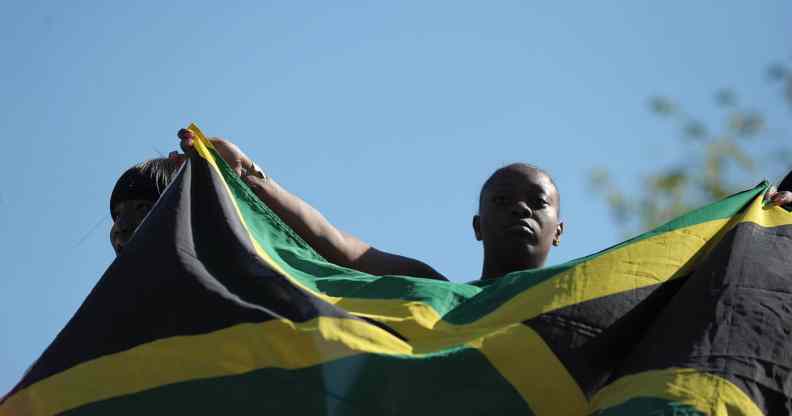Horrific spate of anti-LGBT+ murders in Jamaica investigated in vital new series

In Jamaica, a wave of LGBT+ murders has put a community long familiar to threats to its safety on edge. (Michael Loccisano/Getty Images)
The horrific spate of anti-LGBT+ killings that have fuelled fear in Jamaica is to be investigated as part of a new podcast series.
Ring The Alarm, an Apple Podcasts series that will explore what it’s like to be LGBT+ in the island country, will be hosted by Jasmyne Cannick, one of Los Angeles’ most recognisable Black political strategists and journalists.
Cannick helped capture national attention to the sordid killings by small-time American Democratic donor Ed Buck – now she’s training focus on the creeping homicide rates of LGBT+ people in Jamaica.
“I have always used my platform to elevate Black stories and issues I felt were being ignored and Ring the Alarm is no different,” Cannick told The Advocate.
“When I was asked to come to Jamaica to speak to the LGBTQ+ community and share their stories, I immediately said yes.
“I said yes because American’s have had so much to say about the plight of queer people in places like Iran and Afghanistan but for decades have ignored the murders of lesbian women, gay men, and trans men and women in Jamaica.
“Well not anymore.”
The world ‘can’t keep ignoring’ wave of LGBT+ murders in Jamaica
In Jamaica, it is illegal to be gay, punishable by up to a decade in prison with hard labour. Some take the law into their own hands, carrying out brutal torture and murders that capture the deepening homophobia in the country.
Thugs disfigured his penis before setting him ablaze. He was stoned to death. He was chopped and stabbed by a seething mob for wearing women’s clothing – the years-long wave of LGBT+ murders have left a community already familiar with threats to their safety on edge.
Many queer Jamaicans live in fear, with more than half saying they have been victims of some form of violence fuelled by hatred for their sexual orientation or gender identity, according to the Human Rights Watch.
Contempt towards LGBT+ people is entrenched in the Jamaican state, the group warned.
Activists say that the wave of violence also underscores the precarious position many in the community are paralysed by, facing higher levels of homelessness and poverty.
Queer youth rejected by their families remain among the most vulnerable in society and battle to survive as the public and police target them.
But described by Cannick as like a modern-day underground railroad, countless safehouses provide LGBT+ people with a place of safety, healing and camaraderie.
Cannick hopes to tell the stories behind the safehouses and those who run them while raising money for the organisers. Above all, she hopes to raise national attention once again to a pressing issue – the killing of the most vulnerable.
“Americans love vacationing in Jamaica,” she added, “but just beyond the carefully curated tourism corridor, people are being murdered for being queer.
“We can’t be okay with that. We can’t keep ignoring that.”

